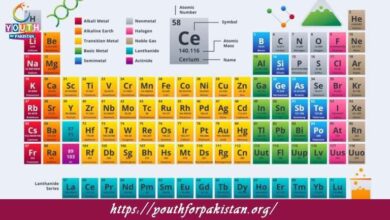12th Class Physics Chapter 17 Quiz with Answers

“12th Class Physics Chapter 17 Quiz: Physics of Solids” discusses the physical properties of solid materials, their structure, and behavior under various stresses, in addition to studying mechanical properties. It is an essential chapter for MDCAT because it provides a fundamental understanding of the properties that define solid materials and a wide range of applications. With our MDCAT Quiz on this chapter, you can test your knowledge and get an idea of the nature of related exam questions.
Overview of Solids
The structure of solids is based on the fundamental arrangement of atoms or molecules, which are closely packed. It talks about the different types of solids: crystalline and amorphous. Crystalline solids have a well-ordered three-dimensional geometric disposal of atoms. On the other hand, amorphous solids do not have such a regular pattern of atoms. Students will learn about how properties such as density, melting point, and thermal conductivity are influenced by the arrangement of atoms in a solid. The details of lattice structure in crystalline solids, including the unit cell, are also explained in detail.
Elastic Properties of Solids
The next chapter is that of elasticity in solids, dealing with the deformation of solids under a variety of forces and how they tend to regain their original shape upon removal of the force. There are two concepts here: stress and strain. Stress is force per unit area applied, while strain is the consequent deformation. Students would learn about various types of stresses such as tensile, compressive, and shearing stresses, and the concomitant strains. The relationship between stress and strain is quantified through Hooke’s Law which states that, within the elastic limit, the strain is proportional to the applied stress.
Modulus of Elasticity
The chapter then goes on to explain the concept of modulus of elasticity to further understand the behavior of solids under stress. It quantifies a solid’s ability to resist deformation under stress. Students will learn about the three main types of modulus: Young’s modulus for stretching or compressing, Bulk modulus for compressing, and Shear modulus for changing the shape of the solid. Each modulus is defined mathematically, and the conditions for their application are explained. Students will also look into the elastic limit of a material, beyond which it will not return to its original shape.
Mechanical Properties of Solids
The chapter further discusses the mechanical properties of solids: strength, rigidity, and ductility. These properties are very important because they explain how materials behave under various forces. Strength is the highest stress a material can undergo without breaking; rigidity is the resistance of a material to deformation. Ductility refers to the ability of a solid to be stretched into a large deformation without breaking; this is opposed to brittleness, where the material fractures under the application of stress. Students will learn how these properties are measured and how they apply to engineering and materials science.
Thermal Properties of Solids
Another topic of this chapter is the thermal properties of solids, which define the contribution of materials in terms of expansion and contraction by temperature change. The coefficient of linear expansion is introduced to explain how the length of a solid changes with a change in temperature. The subsequent concept is that of specific heat capacity, which describes the amount of heat required to raise the temperature of unit mass of any solid substance by one degree Celsius. The relationship between thermal conductivity and the ability of materials to conduct heat proves helpful in understanding the way solids behave in disparate thermal environments.
MDCAT Quiz: Test Your Knowledge of Physics of Solids
Our MDCAT Quiz for Chapter 17 covers key topics such as elastic properties, modulus of elasticity, mechanical properties, thermal properties, and structure of solids in a detailed manner. This will help you test your understanding and ensure you are well-prepared for MDCAT exam questions related to this chapter.
- Test Name: 12th Class Physics Chapter 17 Quiz
- Type: Quiz Test
- Total Questions: 30
- Total Marks: 30
- Time: 30 minutes
Note: Answer of the questions will change randomly each time you start the test, once you are finished, click the View Results button.
Free Flashcards for Physics of Solids
Free Flashcards for Chapter 17, useful for effective revision, cover important concepts like stress, strain, modulus of elasticity, thermal expansion, and mechanical properties of solids. Flashcards help in the reinforcement of key definitions, formulas, and concepts, making it easy to recall them during your MDCAT preparation.

What is the term for the property of a material that opposes the flow of electric current, converting electrical energy into heat?
Resistance

What is the term for a material that has a very low resistance to the flow of electric current?
Superconductor

What is the term for a measure of the difficulty in moving charge carriers through a material?
Resistivity

What is the term for the force that causes electrons to flow in a conductor when subjected to an electric field?
Electric field force

What is the term for a material that has a high resistance to the flow of electric current?
Insulator

What is the term for the rate at which electrical energy is transferred by an electric circuit?
Power

What is the term for the property of a material to resist changes in its electrical current?
Inductance

What is the term for the ability of a material to store electrical energy in an electric field?
Capacitance

What is the term for a material that has electrical conductivity between that of a conductor and an insulator?
Semiconductor
Experience the real exam environment with our expertly designed collection of over 25,000 MCQs MDCAT Mock Tests.





